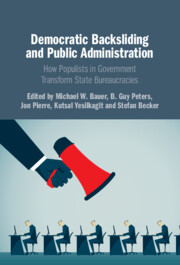 Democratic Backsliding and Public Administration
Democratic Backsliding and Public Administration Published online by Cambridge University Press: 17 August 2021
What happens to state bureaucracies when authoritarianism emerges? How do autocrats seek to use the administration to their ends? This chapter addresses these questions, analyzing Venezuela as a typical or representative case. Venezuela has been a (more or less) functioning democracy since 1958. Within the system of the so-called "Puntofijismo," major parties agreed to a consensual model of democracy, sharing offices and distributing revenues of the oil rent. The public administration supported and managed the distribution. This led to stability and wealth in regional comparison. In 1998, Hugo Chávez, a former military officer and failed putschist, assumed the presidency in Venezuela. In the following years, but especially under president Maduro, Venezuela experienced a severe decline of democracy and is today clearly an authoritarian regime. In this chapter, we analyze the strategies of the Chavista governments vis-à-vis the administration. We identify three main strategies to sideline the established bureaucracy: first, repression and firing; second, circumventing and neglecting, which means creating a "parallel state"; and third, militarization of the "civil" service.
To save this book to your Kindle, first ensure [email protected] is added to your Approved Personal Document E-mail List under your Personal Document Settings on the Manage Your Content and Devices page of your Amazon account. Then enter the ‘name’ part of your Kindle email address below. Find out more about saving to your Kindle.
Note you can select to save to either the @free.kindle.com or @kindle.com variations. ‘@free.kindle.com’ emails are free but can only be saved to your device when it is connected to wi-fi. ‘@kindle.com’ emails can be delivered even when you are not connected to wi-fi, but note that service fees apply.
Find out more about the Kindle Personal Document Service.
To save content items to your account, please confirm that you agree to abide by our usage policies. If this is the first time you use this feature, you will be asked to authorise Cambridge Core to connect with your account. Find out more about saving content to Dropbox.
To save content items to your account, please confirm that you agree to abide by our usage policies. If this is the first time you use this feature, you will be asked to authorise Cambridge Core to connect with your account. Find out more about saving content to Google Drive.